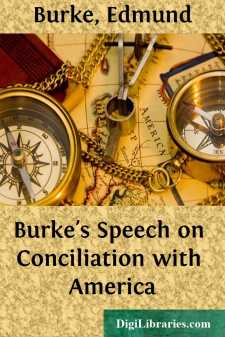Categories
- Antiques & Collectibles 13
- Architecture 36
- Art 48
- Bibles 22
- Biography & Autobiography 813
- Body, Mind & Spirit 142
- Business & Economics 28
- Children's Books 16
- Children's Fiction 13
- Computers 4
- Cooking 94
- Crafts & Hobbies 4
- Drama 346
- Education 46
- Family & Relationships 57
- Fiction 11829
- Games 19
- Gardening 17
- Health & Fitness 34
- History 1377
- House & Home 1
- Humor 147
- Juvenile Fiction 1873
- Juvenile Nonfiction 202
- Language Arts & Disciplines 88
- Law 16
- Literary Collections 686
- Literary Criticism 179
- Mathematics 13
- Medical 41
- Music 40
- Nature 179
- Non-Classifiable 1768
- Performing Arts 7
- Periodicals 1453
- Philosophy 64
- Photography 2
- Poetry 896
- Political Science 203
- Psychology 42
- Reference 154
- Religion 513
- Science 126
- Self-Help 84
- Social Science 81
- Sports & Recreation 34
- Study Aids 3
- Technology & Engineering 59
- Transportation 23
- Travel 463
- True Crime 29
Burke's Speech on Conciliation with America
by: Edmund Burke
Categories:
Description:
Excerpt
POLITICAL SITUATION
In 1651 originated the policy which caused the American Revolution. That policy was one of taxation, indirect, it is true, but none the less taxation. The first Navigation Act required that colonial exports should be shipped to England in American or English vessels. This was followed by a long series of acts, regulating and restricting the American trade. Colonists were not allowed to exchange certain articles without paying duties thereon, and custom houses were established and officers appointed. Opposition to these proceedings was ineffectual; and in 1696, in order to expedite the business of taxation, and to establish a better method of ruling the colonies, a board was appointed, called the Lords Commissioners for Trade and Plantations. The royal governors found in this board ready sympathizers, and were not slow to report their grievances, and to insist upon more stringent regulations for enforcing obedience. Some of the retaliative measures employed were the suspension of the writ of habeas corpus, the abridgment of the freedom of the press and the prohibition of elections. But the colonists generally succeeded in having their own way in the end, and were not wholly without encouragement and sympathy in the English Parliament. It may be that the war with France, which ended with the fall of Quebec, had much to do with this rather generous treatment. The Americans, too, were favored by the Whigs, who had been in power for more than seventy years. The policy of this great party was not opposed to the sentiments and ideas of political freedom that had grown up in the colonies; and, although more than half of the Navigation Acts were passed by Whig governments, the leaders had known how to wink at the violation of nearly all of them.
Immediately after the close of the French war, and after George III. had ascended the throne of England, it was decided to enforce the Navigation Acts rigidly. There was to be no more smuggling, and, to prevent this, Writs of Assistance were issued. Armed with such authority, a servant of the king might enter the home of any citizen, and make a thorough search for smuggled goods. It is needless to say the measure was resisted vigorously, and its reception by the colonists, and its effect upon them, has been called the opening scene of the American Revolution. As a matter of fact, this sudden change in the attitude of England toward the colonies, marks the beginning of the policy of George III. which, had it been successful, would have made him the ruler of an absolute instead of a limited monarchy. He hated the Tories only less than the Whigs, and when he bestowed a favor upon either, it was for the purpose of weakening the other. The first task he set himself was that of crushing the Whigs. Since the Revolution of 1688, they had dictated the policy of the English government, and through wise leaders had become supreme in authority. They were particularly obnoxious to him because of their republican spirit, and he regarded their ascendency as a constant menace to his kingly power....












